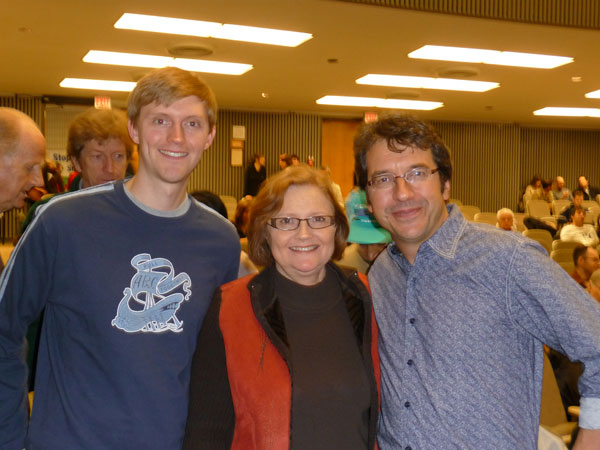When I woke up Saturday morning, the radio was reporting failure in Bali. The first agreement didn’t specify any level of emissions reductions at all, an unbelievably disappointing result. Then later in the day the news came that a second agreement had succeeded in laying the groundwork for mandatory reductions. The way the Globe and Mail tells it, it was a dramatic day, with John Baird being dragged along kicking and screaming the whole way:
Isolated Canada grudgingly accepts Bali deal
GEOFFREY YORK
December 15, 2007 at 11:45 AM EST
NUSA DUA, Indonesia — After a failed attempt to block an agreement, Canada found itself isolated at the Bali conference Saturday and grudgingly accepted a new accord to set a target of 25 to 40 per cent for cuts in greenhouse-gas emissions by wealthy countries by the end of the next decade.
Environment Minister John Baird spoke against the ambitious target, but found himself virtually alone. Only Russia supported him – so he withdrew his objection, sparking a lengthy burst of applause from other countries.
A CP story has an amusing description of how, after attempting to sabotage the whole conference, John Baird then had the audacity to complain that the agreement didn’t go far enough. From the article: “Canada helped gut some of the substance from Saturday’s deal and then expressed regret when the final agreement was ultimately watered down even more than it had hoped.”
How positive this all is, and where we should go from here, depends on your perspective. Here are three different takes, the first from Elizabeth May:
The world community has launched the negotiations originally set out in Montreal in 2005 against a specific deadline. Agreement must be reached by the COP in Copenhagen in 2009. The so-called Bali roadmap covers agreements reached within the two binding legal mechanisms: The U.N. Framework Convention on Climate Change (signed and ratified by Canada in 1992) and the Kyoto Protocol, which was negotiated within the UNFCCC.
Until the 11th Hour (or actually the 11th Hour into over-time), the U.S. blocked progress on the UN FCCC side, while Canada blocked progress on the Kyoto Protocol side. (Since the US has not ratified Kyoto, with the change in Canadian government we are now able to do the U.S.’s dirty work for them.)
…We have a long way to go to get a solid, legally binding treaty ready by 2009 to avoid going past the point of no return in climate impacts. We now have a hope of getting there. By 2009 Bush will be gone. We must all re-double efforts to ensure that Mr. Harper joins his anti-Kyoto buddies, Australia’s John Howard and U.S. President George Bush in happy retirement well before Copenhagen!
George Monbiot is concerned that we’re actually moving backwards:
The destructive power of the US delegation is not the only thing that hasn’t changed. After the Kyoto Protocol was agreed, the British environment secretary, John Prescott, announced that “this is a truly historic deal which will help curb the problems of climate change. For the first time it commits developed countries to make legally binding cuts in their emissions.â€(4) Ten years later the current environment secretary, Hilary Benn, told us that “this is an historic breakthrough and a huge step forward. For the first time ever all the world’s nations have agreed to negotiate on a deal to tackle dangerous climate change.â€(5) Do these people have a chip inserted?
And David Reevely is ready to throw up his hands:
I say screw it. We should stop going. Stop sending words to do the work of deeds. Instead, let’s recognize that reducing greenhouse-gas emissions makes sense not only on its own account, but because it means economic improvements (in the name of efficiency) and more tangible environmental improvements at the same time. Less spewing means less wasting means more money in our pockets. We can even find ways to support investments in efficiencies abroad without having to necessarily play by the Kyoto Accord’s Clean Development Mechanism.
Do not take this as an endorsement of the Harper government’s foolishness, by the way. Canada’s Environment Minister John Baird obviously went to Bali to be a spoiler and he mostly failed and was embarrassed and that’s good. I do believe he didn’t even want to send words, let alone deeds; in the case of Canada’s current government, having to cough up some words was progress.
But for serious people, attending meetings is not a substitute for getting on with the job. That’s all.
I disagree with David that we can afford to give up on working within an international framework, since climate change is an international problem. However, I think he’s completely right in his sense of urgency and his desire for Canada to start taking a leadership role in the world. And that we need fewer words, and more deeds.
Of course, Elizabeth’s also right about the importance of getting rid of the Harper government as quickly as possible, and that Bali can and should be used as a springboard to move forward with positive action. The Conservatives are now in the ridiculous position of having agreed to emissions reduction targets that they claim are impossible to achieve, which means they have no credibility from any angle. We need MPs with a solid plan to reduce emissions while strengthening the economy and safeguarding our quality of life. And soon.
